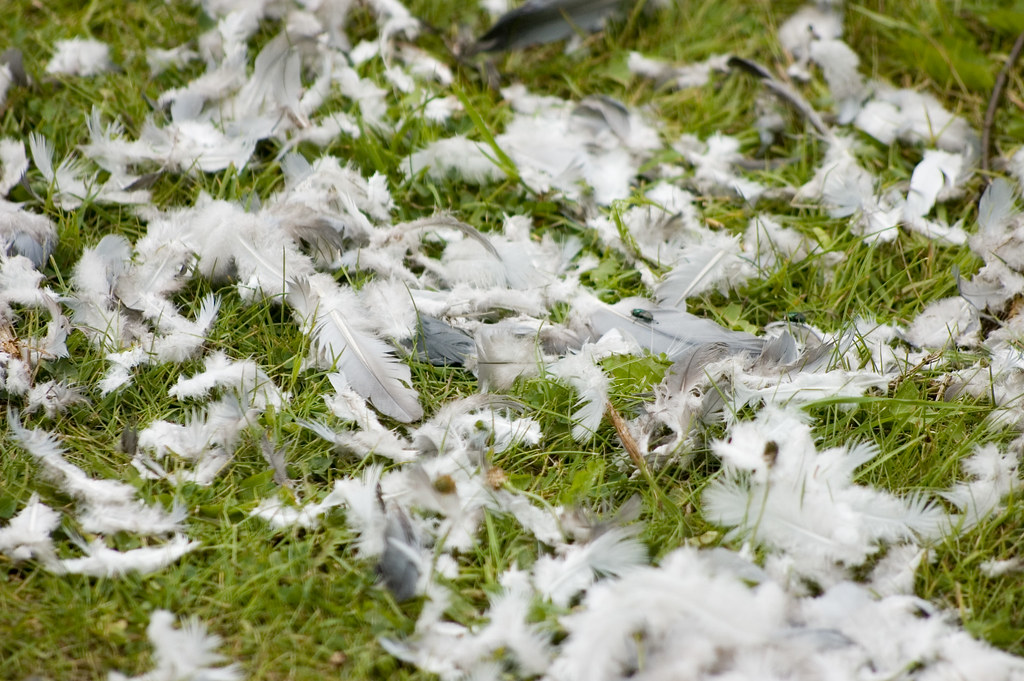Trash is heaped up in alleys, at the ends of driveways: bones of Christmas boxes, turkey carcasses racoons have wrestled free, shreds of wrapping-paper skin. We’re all bloated from too many parties, our annual over-indulgence of yes-yes-yes.
I haul the tree to the attic, grind the last of the leftovers in the garbage disposal. Through the window a smattering of whiteness in the back garden—an odd snow circle, but no, we haven’t had snow. Perhaps mulch mould, but it’s too cold for that. Maybe the dog dragged something back there and ripped it to shreds. She does that. Tissues. Little boxes. Stuffed toys. A carnivorous instinct redirected.
I hate what I find: bird feathers, perfectly plucked, some downy, some slick with the opalescent sheen of a pigeon. No hint of head or clawed foot or angled wing. A cat, no doubt, having his own Christmas feast. Likely our neighbour’s outdoor mouser. I don’t begrudge him, even if neighbours hate his destruction, so many mockingbirds downed beneath their sugar maples.
A week later I’m walking my dog in the alley, all the Christmas trash collected except for the occasional tipped-over pine twined with tinsel, the overlooked ornament. Such a blue-blue sky, and then what looks like a fat snowflake floats down, two, three, but only in one narrow funnel. I trace the trail up as more and more flecks drift down. Is it ash? Burning paper? No. They’re feathers, downy small ones, and I follow the flume to a bird perched atop a telephone pole, preening, I think, loosening a few feathers in the process. But then larger feathers sail down, the ones necessary for flight. Too many for that bird to soar again. And then I understand. It’s a hawk plucking its prey clean, getting to the hidden feast.
I stop to confirm the hawk’s beak, forgetting my dog, who wanders ahead dragging her leash. She pauses and her eyes ask why I’ve stopped, if she should come back. And I worry for her. She’s small, but not light enough for a hawk to swoop down and carry off, though a raccoon could probably wrestle her from a Hefty bag. Cycle of life, and all.
Four days ago we killed an Iranian general. It was a drone strike, another bird of prey. No one breathed, either here in the U.S. or in Iran, as we waited for the fallout. And then it happened, not feathers, but bombs, rained down on an Iraqi airbase housing U.S. soldiers. No one was killed. It was a calculated response of face-saving de-escalation.
Three years ago, after another Christmas, I found a drone in my backyard, a spidery thing with four propellers. A kid’s toy like something out of Star Wars. I imagined the frantic children roaming the streets and alleys for their lost gift, a father growling behind them at the expense, the waste. So I hauled it to the end of my driveway where it might be more easily found. A few hours later it was gone, safely tucked back beneath the tree, or in some kid’s bedroom where he spun the propellers while plotting his next manoeuvre.
Here, in this alley, it’s stopped snowing feathers. The hawk eyes me, my dog, so I back away, one eye on the bird until the snow starts again as the bird returns to her feast. Danger averted for me, for my dog, for children tucked safely in their bedrooms here and in Iran, and finally, for just a minute, I can breathe.
Marie Manilla is a graduate of the Iowa Writer’s Workshop. Her novel, The Patron Saint of Ugly, received The Weatherford Award. Shrapnel won The Fred Bonnie Award for Best First Novel. Stories in her collection, Still Life with Plums, first appeared in the Chicago Tribune, Prairie Schooner, Mississippi Review, and other journals. Her essays have appeared in Word Riot, Cossack Review, Still, and elsewhere. Learn more at www.mariemanilla.com.

